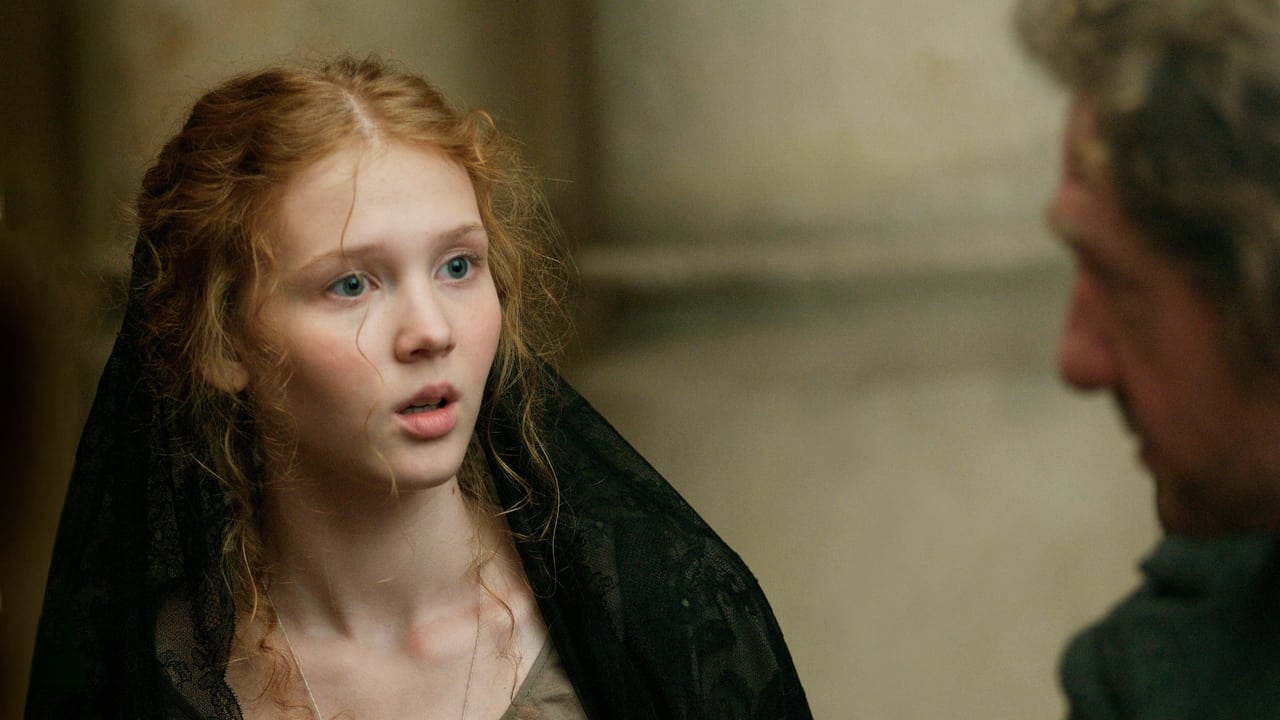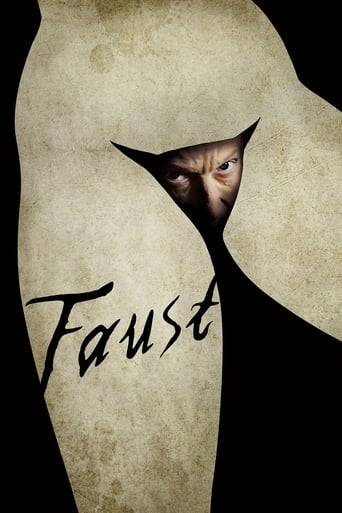


I came to know quite late the works of the Russian director Alexander Sokurov, and I cannot say I know them well today either. The first one I have seen was Russian Ark, a splendid exercise in virtuosity, composition and visual beauty, but lacking almost completely any epic structure. Next came the 3rd film in his tetralogy about men and power, The Sun which had emperor Hirohito in his days of defeat at the end of WWII as main hero. Now I have seen the 4th film in the series, a very different, special and personal version of the story of Faust. I am yet to see the first two films in the same series which deal with the portraits of Hitler and Lenin, as well as other of his works that drew the attention of audiences and critics like 'Father and Son'. So the impressions here are to be seen as partial notes on my route of better knowing one of the major artists in modern cinema. I am yet to form a dependency for his work or to declare admiration for the director, but I may get there some day.On many respects this 'Faust' is close to 'Russian Ark'. It is one of the most beautiful and complex pieces of visual art that I have seen lately and I cannot skip mentioning here in this context the name of the director of photography Bruno Delbonnel author of such other wonderfully filmed works like 'Amélie' or 'Harry Potter and the Half-Blood Prince'. Sokurov creates a world of his own with hundred of characters, costumes, and behaviors studied and acted to the smallest detail. The world is a synthesis not only of the German world at the time Goethe wrote the original story but of all that was Europe from the Middle Ages to the 19th century. It can happen and it actually happens at any of the moments in that period.Sokurov takes inspiration from the work of Goethe but does not follow it closely. This film is certainly not Goethe's Faust, it is at best 'inspired' by it. It is Sokurov's Faust before all - a work about a man, a scientist and a philosopher searching for the sense of life, mired by an incarnation of the Devil into knowing the savage real world and the wild people who populate it, choosing beauty in the person of a beautiful girl, selling the soul he does not believe it exists in order to spend a night with her, and eventually revolting against the payment he signed for. A more human Faust than in most of the other versions we know.If this Faust was only a video art work I would have completely fell under its spell. It does have however a narrative dimension, and this is where I found the pace and the style unnecessarily complicated, and the usage of dialog too heavy to follow easily and to be a pleasant experience for the viewers. Acting on the other hand is exquisite - Johannes Zeiler is a Faust torn between the desire to conquer the universe by understanding its mechanics and the passion that burns up his human shell, Russian actor Anton Adasinsky is amazing as the ugly sub-human Moneylender who opens the door to Faust's meeting with the ugliness of the world, and the contrasting Isolda Dychauk as a young botticellian Margarete who descends directly from Vermeer's paintings. This is one of these movies where the attention is drawn at any moment by visuals, and when it ends you tell yourself that you must have missed many of the hidden and deeper ideas. This may be true, but not completely, as Sokurov seems to be one of those directors who love to keep some of the details explained for himself only, assuming that he knows them at all.
... View MoreThe 2011-film Faust was one of the big awards players outside of Hollywood. It is not the first Sokurov movie in German, her made one in 1999 already in a movie series where "Faust" is already the fourth entry. He is one of the most famous Russian directors right now and has been especially present at the Palme d'Or film festival in the past. And he is also a writer for the movies he makes, such as this one. Personally, I feel this film looks much older than not even 5 years ago.The main character is played by Johannes Zeiler and he looks a bit like Ralph Fiennes. Mephisto (or the Moneylender) has not acted in movies after this one here, but I read he has his own theater, so he's probably pretty active nonetheless. Apart from them, there are several (known) German actors in here, such as Hanna Schygulla or also Antje Lewald who I saw first in the Campers TV show. The film runs for considerably over two hours and is of course about the Goethe work, but still several steps are in-between. It is based on Yuriy Arabov's adaptation and was altered again by Sokurov into the final version. I am not too sure how close it is still to Goethe's work as it's been too long since we had it at school, but the three central characters are obviously all there.All in all, I was not too impressed and sometimes I even felt it dragged, so I would not really recommend watching it unless you love story and are really curious about this adaptation.
... View MoreFAUST tries a bit too hard at times to shock, or to impress with its technical aspect: the opening close-up of the rotting genitalia of a male cadaver being autopsied pretty much sets the tone; anything goes. Unfortunately, that includes some fairly simple but overused in-camera effects, like the use of distorting lenses (which add absolutely nothing to the meandering narrative and actually detract from the lavish production values). Death, himself, is a bore who waddles around in a rubber fat suit "weighing souls." "Is the world too cramped for you?" someone asks at one point. It's a question I pondered even as I watched this one unfold: having spent far too much of my time watching experimental films and video over the years, I can honestly say that- for ME- the world IS cramped with far too many such films.
... View MoreWhere to begin with a review of Aleksandr Sokurov's Faust? Loosely based on Johann Wolfgang von Goethe's 19th century play, this Russian film resolutely defies description on normal terms. Sokurov adorns his film with sumptuous visuals throughout but adopts a very idiosyncratic storytelling technique which will prove baffling for most viewers. This is not a film to be watched lightly – you will need to be wearing your "intellectual hat" if you're to make it through two and a half hours of Sokurov's exceptionally erudite movie-making style.In the 19th century Heinrich Faust (Johannes Zeiler), a tormented scientist, desperately seeks answers to questions that hang tantalisingly beyond his grasp. Often he hires local grave robbers to dig up corpses so that he can dissect them, exploring the inside of the human body to satisfy his gruesome curiosity. What are the various organs for? What makes the body work? Is there such a thing as a soul and where is it to be found? Hopelessly disillusioned by his father's fake cure business, which mostly causes the death of patients rather than their recovery, Faust decides that he has had enough of spending his life chasing enlightenment. He is about to commit suicide when he is interrupted by the arrival of devilish deformed racketeer Mauricius (Anton Adasinsky). Mauricius leads Faust on a grotesque tour of the town, taking him into the underbelly of the community and tempting him with various sinful pleasures. He manipulates Faust at every opportunity, involving him in indulgence, lust and murder. Soon Faust finds himself infatuated with young washer-woman Margarete (Isolda Dychauk), and Mauricius eventually reveals that Faust can have her if he agrees to sign away his soul.The film is remarkable to look at, with an array of amazing sets and locations beautifully captured by cinematographer Bruno Delbonnel. The characters consist of a gallery of peasants, rogues and freaks, all performed evocatively enough by the actors but too obscurely written for the audience to truly identify with them. Indeed, therein lies the main fault with Faust it's not just the characters but the story itself that is too obscurely drawn for the film's own good. Faust won considerable admiration on the international circuit, crowning its achievements by becoming the recipient of the prestigious Golden Lion at the Venice Film Festival. It certainly has its strengths, such as the splendidly creepy performance of Adasinsky as the story's Mephistopheles figure, and the wonderfully evocative photography. However, one would have to question whether the film deserves to have been showered with the accolades that it has received. Things like confusing subtitling, perplexing dialogue and unclear story development drag it down somewhat and make one wonder quite why it has earned such towering praise. Having said that, Faust is worth a look, especially if you are interested in Faustian literature (e.g. Goethe's play, Thomas Mann's novel, or even the original Elizabethan play Doctor Faustus by Christopher Marlowe). Just be sure to prepare yourself in advance for a very heavy-going experience and don't allow yourself to anticipate some sort of extraordinary experience as promised by the glowing reviews. A life-changing, mind-blowing masterpiece, no. A flawed but interesting Gothic melodrama, yes.
... View More